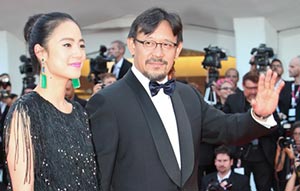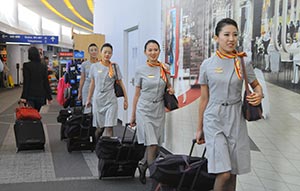

On trade, both sides want to avoid protectionist sentiments, and China wants to make sure the US continues to be a fairly open trade regime that does not implement protectionist tariffs, Huang said.
The United States will want to talk about whether Chinese exporters and producers have unfair advantages in terms of subsidies or interest rates, he said.
Glaser said tensions on the Korean Peninsula will certainly be on the agenda, including conditions for dialogue and resumption of the six-party talks.
The cyber issue is also likely to be addressed, Glaser said. The United States has in the past accused China of cyber espionage, but China refutes those claims and says it has also been a victim of cyber spying as shown in the Snowden revelations.
Some experts maintained that last month's summit meetings put the two sides on the right track to discuss the cyber issue, with some arguing the US media has blown the problem out of proportion.
Glaser also pointed to comments made earlier this month at the ASEAN Regional Forum, in which US Secretary of State John Kerry spelled out what his country hopes to achieve.
Kerry noted growing international concern about the risk of conflict that could result from countries' actions on cyber space, including mistaken attribution.
Huang said climate change will also come up, adding that green technology is one area in which the two countries could collaborate, as the US side possesses much technological expertise and China is able to mass produce equipment that can help reduce the global carbon footprint.
China and the United States have been holding the annual S&ED talks since 2009, when Obama came to power, as a major channel of communications to enhance mutual trust, boost cooperation on varied fields, and properly deal with differences to prevent them from derailing the general relations.
 Models at Ford pavilion at Chengdu Motor Show
Models at Ford pavilion at Chengdu Motor Show
 Brilliant future expected for Chinese cinema: interview
Brilliant future expected for Chinese cinema: interview
 Chang'an launches Eado XT at Chengdu Motor Show
Chang'an launches Eado XT at Chengdu Motor Show
 Hainan Airlines makes maiden flight to Chicago
Hainan Airlines makes maiden flight to Chicago
 Highlights of 2013 Chengdu Motor Show
Highlights of 2013 Chengdu Motor Show
 New Mercedes E-Class China debut at Chengdu Motor Show
New Mercedes E-Class China debut at Chengdu Motor Show
 'Jurassic Park 3D' remains atop Chinese box office
'Jurassic Park 3D' remains atop Chinese box office
 Beauty reveals secrets of fashion consultant
Beauty reveals secrets of fashion consultant